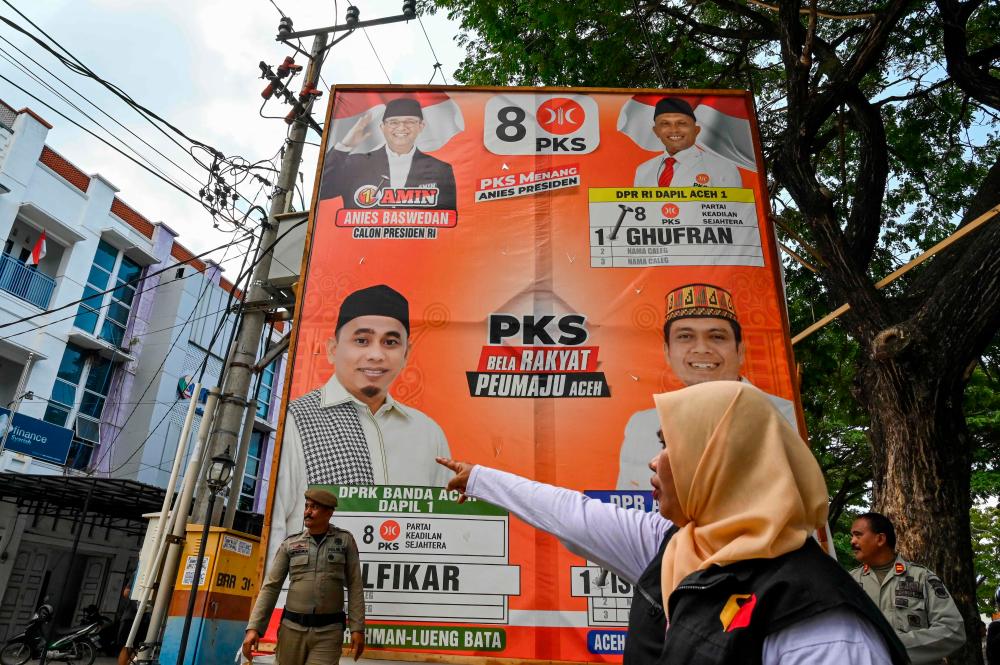JAKARTA: Indonesia's presidential election will be held on February 14, with three candidates battling to lead Southeast Asia's biggest economy and the third-largest democracy in the world.
The relocation of the archipelago’s capital from Jakarta to Nusantara on Borneo island and the fight against corruption are two key issues to succeed President Joko “Jokowi” Widodo after a decade in power.
Here are the candidates:
- Prabowo Subianto -
Subianto, 72, of the Advanced Indonesia Coalition is the frontrunner in the contest with polls projecting he will win a majority.
He currently serves as defence minister after losing to Widodo in the 2014 and 2019 elections.
Schooled internationally, the defence chief is a retired military general who was fired in 1998 for allegedly ordering the kidnapping of tens of pro-democracy activists in unrest following the fall of dictator Suharto.
Together with President Widodo's 36-year-old son Gibran Rakabuming Raka as his vice presidential candidate, Subianto has been outspoken about carrying on the incumbent leader's policies.
Subianto has pledged to eradicate childhood stunting due to malnutrition by offering free lunch to students, becoming one of his most popular programmes, with the prevalence of stunting falling from 27.7 percent in 2019 to 21.6 percent in 2022.
The defence chief has also committed to continuing a nickel ore export ban imposed by Widodo to increase national income from the mining sector and turn Indonesia into a developed nation.
“In less than two years, our income has increased 10 times to $33.3 billion because of this,“ Subianto told a campaign event.
He has also changed his public persona to woo voters, using a slick social media strategy that has seen videos of him dancing go viral.
It has transformed his image from a figure of strength to what some users have called a “cute grandpa”.
- Anies Baswedan -
Former Jakarta governor Anies Baswedan has portrayed himself as the anti-establishment candidate in Indonesia's presidential campaign, climbing to second place in polls on the back of a message that includes opposing a costly relocation of the capital to Borneo.
That line of attack has seen his stock rise and he is now polling in second as the main challenger to Subianto.
Baswedan, 54, is nominated by a coalition in which his National Democratic Party is supported by two Islamic parties.
He is popular with conservative Muslims and Islamists in the Muslim-majority country.
Baswedan has repeatedly claimed democracy has suffered under Widodo's rule.
The former minister of education also opposes the idea of moving the capital to Borneo.
Baswedan has promoted pouring money into more than a dozen existing cities to boost economic equality instead of developing a new capital from scratch.
However Baswedan previously courted controversy in Jakarta's 2017 governor election when he faced Christian candidate Basuki Tjahaja Purnama and was accused of stoking religious divides.
- Ganjar Pranowo -
Ganjar Pranowo pushed his humble background to emerge as a leading Indonesian presential candidate, but his campaign has flared out in the lead up to next week's election.
The former governor of Central Java for two terms, Pranowo was the main opponent to Subianto after being nominated as the candidate for a coalition led by Widodo's ruling Indonesia Democracy of Struggle Party (PDI-P).
Baswedan has since overtaken him in the polls.
The 55-year-old silver-haired politician is focusing on bread-and-butter issues, prioritising access to health, housing and food.
He has picked current chief security minister Mahfud MD as his running mate and put corruption eradication high on his campaign agenda.
Like Subianto, he is promising to carry on Widodo's policies, such as moving the capital.
Pranowo and Mahfud are the only candidates who have experience in three areas of power: legislative, executive, and judicial.
He was initially viewed as the presidential frontrunner but lost support over his opposition to Israel's participation in the FIFA Under-20 World Cup last year, which Indonesia was set to host but lost the rights over the issue. -AFP









